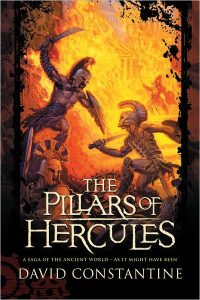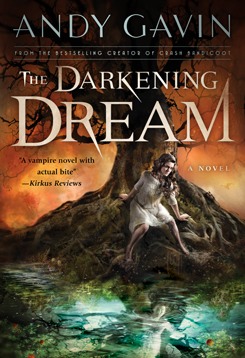 Title: The Pillars of Hercules
Title: The Pillars of Hercules
Author: David Constantine
Genre: Historical Fantasy
Length: 411 pages
Read: March 16-17, 2012
Summary: Bronze-punk!
The Pillars of Hercules is a very fun read and takes a serious stab at something I haven’t really seen before and is very much up my alley. For lack of a better term: bronze-punk.
What we have — for at least the first two thirds — is a combination alternate history and speculative technology book, set in 330 BC. Now this is a fun and tumultuous period, that of Alexander the Great and one which was to see (in real life) immense changes in the euro-Asian political scene which shaped the world we know. At the political level, David Constatine is clearly knowledgable and very fond of the period. He speculates on a number of specific deviances from real history: The success of Athens‘ disastrous (in real history) Sicilican campaign, giving rise to a stronger Athenian Empire. And the survival of both Phillip and Alexander past their fated dates. I found this play out fascinating and entirely reasonable.
To this, he adds a rather extreme amount of extended technology based both on secret discoveries from previous (read Atlantian) civilizations, and real ancient tech amplified by geniuses such as Aristotle who are astoundingly more practical (in the vein of Tony Stark x 1000) then their real life counterparts. Most of these inventions are weapons and war machines. Plenty of this tech does have precedents in the ancient world such as steam engines. But in a society where the cost of labor was nearly zero (slavery being more the rule than the exception) there was no impetuous for mechanization (That would take the depopulating effect of the middle ages and the plague to bring about). I found this stuff fantastic fun. But Constantine does take it a bit far for little purpose in the form of semi-sentient gear work golems and the like (not that I don’t have clockwork men if my own in Untimed). The almost magic tech of the “gods” was also a little much. But it was good fun.
Against this rather magnificent backdrop we have an adventure and war story of lightning pace and heroic proportions. Point of view-wise about two-thirds of the story is told by a Gaulic mercenary who is along for the ride with a Persian noblewoman “in the know” about some of this extreme tech in her quest to stop Alexander from taking over the world. The big political scope of the book involves Alexander, having survived his in-real-life fatal illness/poisoning, and who goes on to try and conquer the Western Mediterranean from the Athenian Empire. In the other third of the narrative we see Akexander’s plots and conquests through the eyes of a couple of his generals and foes. One of these, his right hand man, gets a good number of pages and has a developed POV. Most of the others serve as human cameras.
The first two-thirds of the book is therefore mostly glorious (and very fun) high swashbuckling action on the part of the merc or generals in the midst of a near-continuous series of huge battles, sieges, daring breakins, escapes, and naval chases. There isn’t much focus here on emotions of character arcs. The characters aren’t cardboard either, just fun, and free of internal serious flaws that need resolving. And the action is often so grand as to completely stretch the reality factor. But it is good fun and reminds me of some of the best Philip Jose Farmer.
Then at about the 70% mark most of the threads pass west of the titular Pillars of Hercules and things get weirder. Not that the pace of action lets up, but instead of being set in the likes of Alexandria, Athens, Syracuse, or Carthage, literally descends into a sort of mechanized Hades filled with machines of the gods. While well executed, and providing the book with a larger mythic framework, I personally can’t help but think Constantine went too far. That the overall effect would have been a little more satisfying sticking to this fantastic world closer to our own.
Still, highly, highly recommended.



